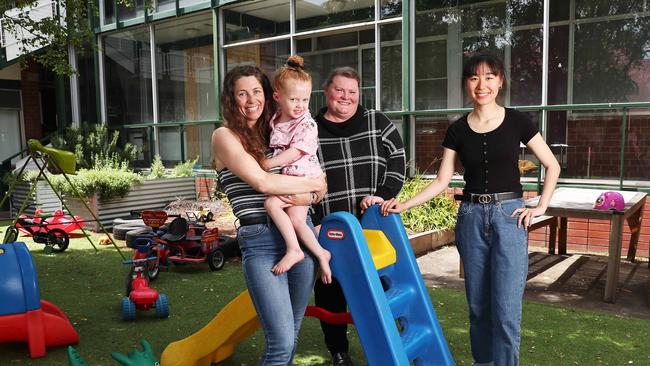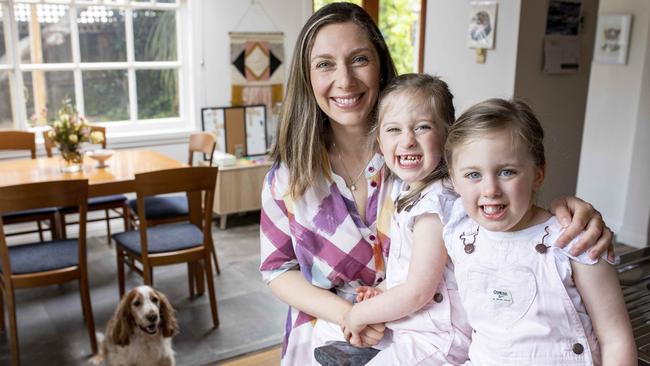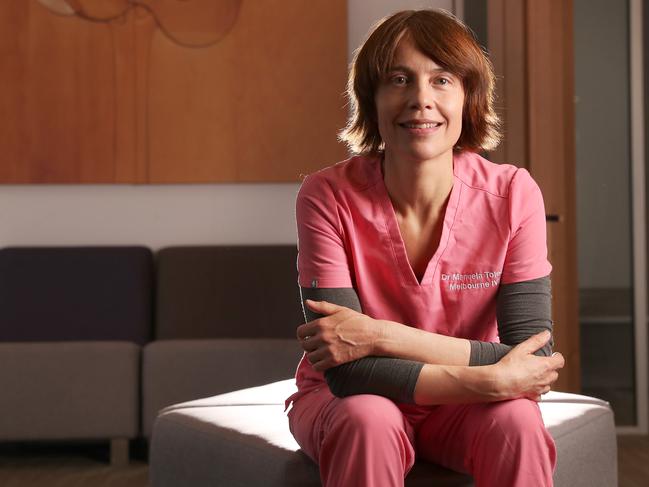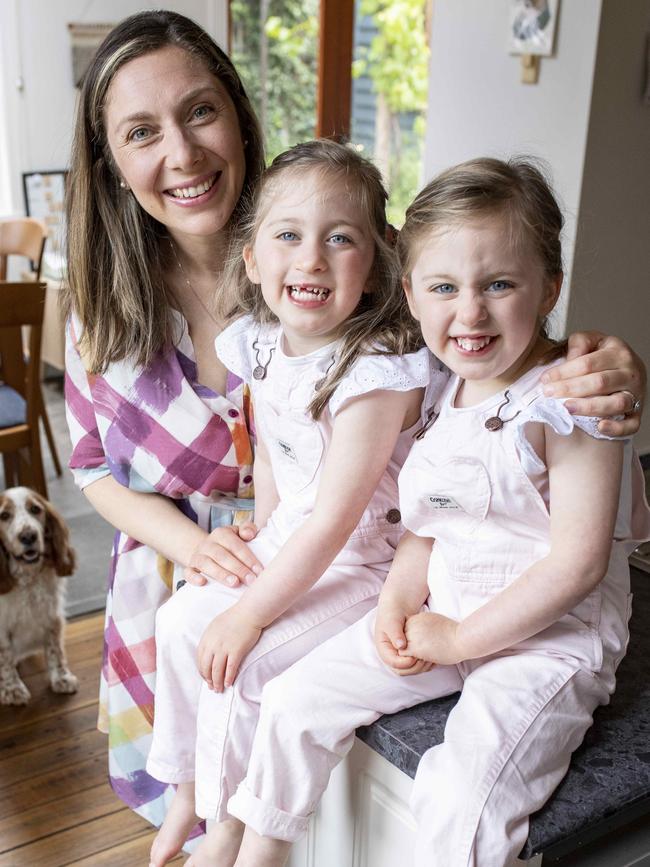Hobart City Mission’s Small Steps program calls for more volunteers
A live-in parenting and life skills program for young Tasmanian mothers facing challenge has put out an urgent call for volunteers. DETAILS >>
Tasmania
Don't miss out on the headlines from Tasmania. Followed categories will be added to My News.
As a single mother of four children and a former midwife helping women in their time of need, Small Steps volunteer Kylie King understands all too well what it is like for mothers facing extra challenges in their parenting journey.
The Small Steps program is run by Hobart City Mission, providing a live-in parenting and life skills program in Hobart for mothers aged 15-25 and their children, and another 10-15 volunteers are urgently needed.
Ms King said her own personal background along with prior work as a nurse in disability care and volunteering for other charitable causes drew her to volunteer.
“It is hard enough just being a mum sometimes and a lot of these girls don’t have any support which is what really drew me to want to help,” Ms King said.
“Even though I raised my children by myself for 5-6 years I was so lucky to have the support of my family.”
Being a first time mother, Alyssa Honey felt so fortunate to receive a helping hand from Small Steps over the past eight months.
Miss Honey said she, the volunteers and the others mothers have “always got each other’s backs” and the support in navigating this tricky time in her life has been a lifeline.
She and her daughter Mia Elliott, now aged 18 months, have had a great experience during their time with the program.

“If I get stressed out I can just take five minutes and (the volunteers) distract her for me, it really helps so much,” Miss Honey said.
Volunteers provide overnight or weekend support to the mothers and their children, help them with minor medical issues the children may have, provide low-level guidance and emotional support for mothers in caring for themselves and their children, and support the mothers to make them feel safe, secure and comfortable.
Volunteers work on a rotating roster with 1-2 shifts a week depending on availability, and they are provided with a unit on-site to stay in during their shifts and training and guidance in their role.
“We’re ultimately looking for people who are non-judgemental and keen to support young mums in the ways that they need,” Small Steps program leader Denise Brazendale said.
“We have some volunteers who are studying community services and are keen to gain some experience in the sector.
“And then we have some volunteers who are grandmothers and are excited to help young mums in which ever way they can.”
With two personal mottos that guide her, Ms King said she is looking forward to helping other mothers to become empowered in their parenting.
“Educate and activate, so there is more awareness of the issues young people face,” she said.
“And the support we shower is a gift to empower.”
For further information contact Sara Shepherd on 0438 421 076 or sshepherd@hobartcitymission.org.au
New rebate helping Tassie parents cover cost of growing families
CHLOE Wise’s fertility journey began like any other, as the healthy and happily married 30-year-old patiently waited out the months until she naturally conceived.
After a year, Mrs Wise was impatient to feel the joy of a babe in her belly, so she decided to take the matter into her own hands and booked a consultation with Melbourne IVF.
Encouraged to try PDG (Pre Disposed Genetic testing) to rule out any issues, Mrs Wise was diagnosed with a rare genetic variant called a Balanced Translocation and her heart sank as she realised “I had a very slim chance of falling pregnant naturally with a healthy baby”.
Mrs Wise is thrilled with the recent federal announcement that Australians undergoing IVF are able to claim a Medicare rebate for genetic testing such as PDG for hereditary diseases, which cost her family $700 for each of the three embryos she has had tested over time.

The genetic testing is a huge expense for families, on top of the upfront costs of the rebatable IVF which Mrs Wise said cost her family in excess of $10,000 for a single round.
“I had no idea of any hereditary family issues and no idea what a Balanced Translocation meant,” she said.
“When I asked (the specialist) how many people they knew of that had my specific Balanced Translocation they said they had never met anyone with it and only 1 in 55,000 people have it.
“That’s when I though ‘oh my gosh we are never having a baby’, it was hard to hear.”
Fast-forward several years, Mrs Wise and husband Caleb now have four-year-old twin daughters Olive and Luella who are “full of beans and ready for kindergarten”, conceived from one round of IVF.
Looking to grow their family further through Hobart clinic TasIVF, they have since tried IVF again and utilised PDG and are currently going through what Mrs Wise said would be their last attempt at IVF.
The Wise family are one of the first in Tasmania to access the new Medicare rebate, and Mrs Wise said it was a huge coup and it should have been offered sooner.
“I’ve been an advocate for IVF (treatments) for years and I’m just so unbelievably happy that it (genetic testing) has finally been recognised,” Mrs Wise said.
“There is a stigma that stops people from seeking help if they need it and there really shouldn’t be, so this helps with that.”

TasIVF medical director Dr Manuela Toledo said genetic testing has been available for almost two decades and is regularly used, adding $5000-$8000 to a family’s fertility bill.
Genetic testing typically used is PDG or PGS (Pre-Implantation Genetic Screening).
The most common conditions screening picks up includes cystic fibrosis of which 1 in 20 people are carriers, spinal muscular atrophy of which 1 in 80 are carriers and fragile x of which 1 in 150 are carriers.
“This Medicare rebate is really exciting and it’s exactly what the fertility community has been lobbying for, to help these patients doing IVF to avoid passing on serious genetic conditions,” Dr Toledo said.
“This makes sense to everyone, the families and even the wider community, to avoid passing on these conditions that will lead to hospitalisation and medical care for the rest of their lives.”
The IVF process is often fraught with emotional, mental and physical effects for women, and the extra stress of genetic testing can take its toll.
These realities are something that Mrs Wise understands all too well and has decided to write about in her recently launched blog called Thirty where she hopes to help others feel less alone in their IVF experiences.

“Because we had such a wonderful start with our first round of IVF we had high expectations undergoing our next rounds, so it was a very big fall to find out the last transfer of an embryo didn’t work,” she said.
“Then we had another cycle where we collected 21 eggs and nine turned into embryos but none were healthy enough to biopsy for PDG.
“You feel anger, rage, then guilt, shame and embarrassment and no one talks about it, IVF (experiences) are hidden.
“You feel like your body should be able to do this, it is made to do this.
“This will be our last cycle and I feel like we are lucky to have our beautiful girls; so maybe it’s time to just ride the rollercoaster with them starting kindergarten – whatever happens we have been blessed.”
Read Chloe Wise’s blog HERE and for further information on genetic testing contact TasIVF on 1800 111 483.



